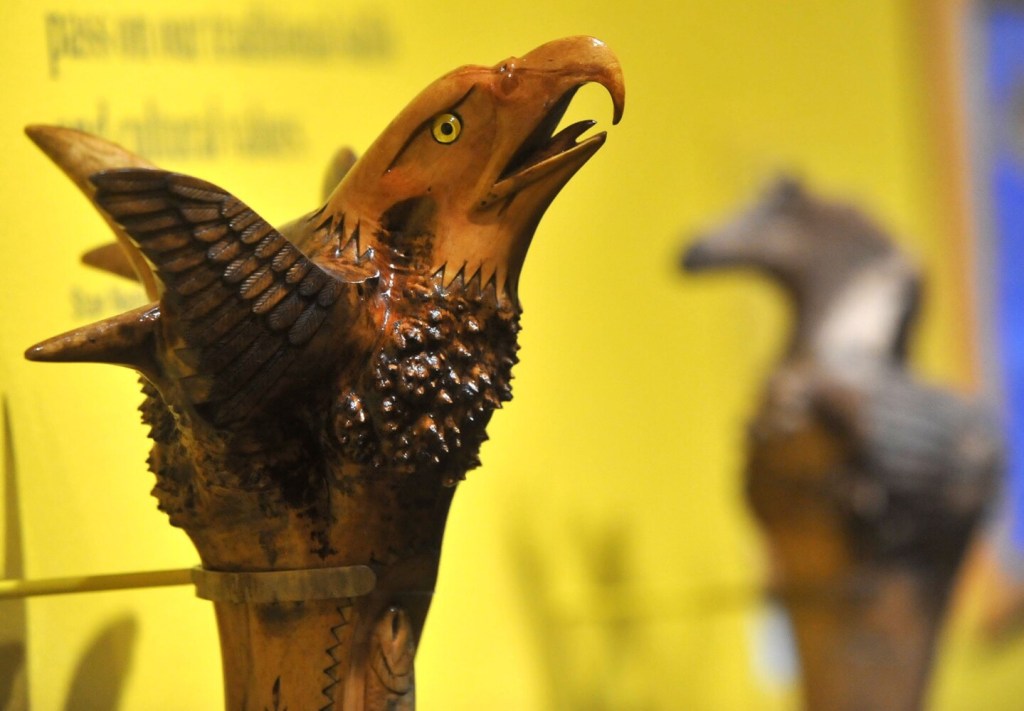WATERVILLE — Colby College kicked off Maine Craft Weekend with an exhibit to honor Native American tribes and their artistic works and to share stories of the Wabanaki.
The exhibit, “Wíwənikan … the beauty we carry,” includes works from 38 artists, who are referred to as First Nations people of what is now Maine and Maritime Canada. The Wabanaki comprises the Maliseet, Mi’kmaq, Passamaquoddy, Penobscot and Abenaki tribes.
Maine Craft Weekend is an annual statewide tour of craft studios, businesses and events intended to celebrate the life and work of local artists. The calendar of events is produced by Maine Crafts Association in partnership with Maine Made and is scheduled in conjunction with American Craft Week.
The title of the exhibit, “Wíwənikan,” is the Penobscot word for portage. Jennifer Neptune, a curator on the project and Penobscot tribal member, describes the metaphor that goes along with the name in the exhibit’s book. The exhibit includes artistic works, including baskets, paintings and jewelry as well as tribal clothing and a canoe.
“She envisioned that the title has been about peaks and valleys. Her metaphor was very cool and talks about the portaging, where you pick up and carry everything, carrying the beauty forward. Eventually, you put it down for a while and come back to it,” Theresa Secord, a curator for the exhibit, explained during her guided tour.
Secord is a member of the Penobscot tribe and has been weaving baskets for 31 years.
“I’m really proud of the great work that we’re starting to do,” Secord said.
Included in the exhibit is a land acknowledgement, which Secord proudly explained.
“I thought this was really well done that Colby College recognizes that we’re situated on the homeland of the Wabanaki and their respect toward the indigenous communities who have lived on these lands for almost 15,000 years.” she said.
Maine has five reservations throughout the state, including two Passamaquoddy, one Penobscot, one Mi’kmaq and one Maliseet reservation.
“(The land acknowledgement) is really neat and timely,” Secord said.
Secord also spoke of an environmental threat that is destroying Maine’s ash trees. The tree is used by Wabanaki artists to create various items, including baskets. The tree is dying out due to the emerald ash borer, an invasive species that is dwindling out ash resources and forests around the state. According to Secord, it takes about 60 years for basket trees to grow and she sees the trees being gone within a decade due to the invasive species.
The Wabanaki artists learn their craft through generations of traditional practice that connects them to a larger sphere comprising family and other tribal members, as well as language keepers, historians, teachers, foresters, environmental advocates and culture bearers.
Secord had one of her own baskets displayed in the exhibit.
“A lot of (the baskets) are made with forms, but not all of them,” Secord said. “The piece that I have is made by a puzzle mold to help with the symmetry. It’s traditional to use the molds and it makes it easier. The ones that I have used come down to me through six generations.”
Included in the exhibit was work from Jeremy Frey, a Passamaquoddy basket-weaver who specializes in ash fancy baskets, a traditional form of Wabanaki weaving. Frey’s work is recognized throughout the country, having been featured in the Museum of Art and Design in New York City as well as pieces at the Smithsonian.
“Maine has a really long craft tradition,” Secord said. “Jeremy’s individual baskets sell for $25,000-$30,000. He’s won top prizes and is one of the most awarded Native basket makers in the nation, he’s really a rockstar.”
The project has been a long time coming, Secord told the group on Saturday. She did mention that two of the 38 artists being showcased, Pete Moore and Fred Tomah, have died since the project kicked off.
Maine Craft Weekend will resume throughout the weekend in various locations around the state. At Colby, Secord will give another tour on Sunday. More information on the weekend’s events and future happenings can be found at https://mainecraftweekend.org/.
“Colby’s work and care about diversity, inclusion and equity is reflected here because tribal communities are working really hard to save things, so this was important to Colby that the work in this exhibition really reflects the work that’s going on in tribal communities,” Secord said.
Comments are not available on this story.
Send questions/comments to the editors.



